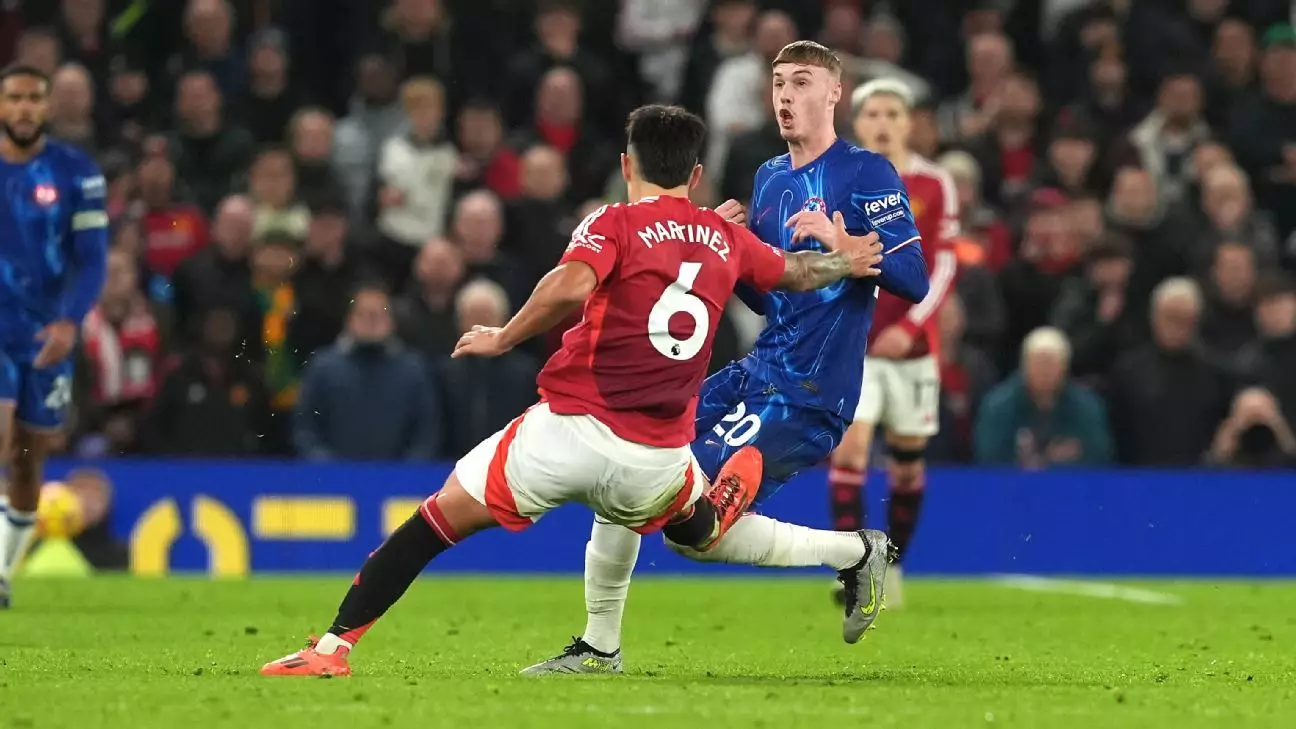The introduction of the Video Assistant Referee (VAR) system in the Premier League has not been without its fair share of controversies. Each weekend, fans and analysts alike grapple with the perplexing decisions rendered during matches. This article endeavors to dissect some notable instances of VAR usage over the past weekend, focusing on how decisions are reached and whether or not they align with the established laws of the game, ultimately probing the efficacy and transparency of this technology.
One of the contentious moments involved Manchester United defender Lisandro Martínez and Chelsea’s Cole Palmer. As the game approached the dying moments, Palmer attempted to maneuver the ball past Martínez, who responded by extending a leg to stop the attempt. Referee Rob Jones initially opted to play an advantage but eventually called back the play after Chelsea lost possession, showing Martínez a yellow card. The situation sparked debate—should it have been a straight red?
VAR referee Michael Salisbury reviewed the incident, opting against upgrading the decision. The rationale behind this seemingly lenient judgment is rooted in the Premier League’s high threshold for VAR intervention. Statistics reveal that last season, while ten serious foul play red cards were given via VAR, additional incidents suggested a need for further scrutiny. This raises concerns about consistency within the refereeing framework and leaves players like Martínez feeling fortunate to escape ejection.
Martínez’s challenge, which involved high contact with studs visible, begs the question of whether it truly endangered the safety of his opponent. Given that referee Jones had initially produced a yellow card, VAR evidently lacked compelling evidence to challenge this call despite the apparent transgression on Martínez’s part. Such inconsistencies reflect a convoluted process that often frustrates players and supporters alike.
The case of Ipswich Town introduces another dimension to the VAR discussion. After being awarded a free kick, a follow-up incident saw Ipswich’s Conor Chaplin go down following a collision in the area. Referee Tim Robinson opted to allow play to continue, which led to a chain of events resulting in a foul and a second yellow card for Kalvin Phillips of Leeds United.
When VAR intervened to assess potential penalty claims for Ipswich, the decision was ultimately to not award one, causing an uproar among fans, especially given Ipswich’s unfortunate status as the only club in the league yet to receive a penalty in their favor via VAR this season. Their chairman expressed vocally the frustration over this perceived injustice. However, while fans may feel wronged, the Key Match Incidents (KMI) Panel deemed all decisions correct, reflecting the subjective nature often inherent in VAR evaluations.
For Ipswich, it illustrates the challenges newcomers to VAR may face when adapting to the nuances of officiating in the Premier League, especially when subjective judgments seem to tip the scales unfavorably against them.
Crystal Palace’s Late Drama Derailed
In yet another incident, Crystal Palace experienced the sting of VAR as they thought they clinched a dramatic stoppage-time winner. The referee initially allowed the goal to stand but quickly disallowed it due to an apparent foul on the goalkeeper. Assessing the peculiar nuance of goalkeeper control in such instances remains crucial. The law states that if a goalkeeper has any part of their body—such as a finger—on the ball, they cannot be challenged. Ultimately, it was deemed that the grasp possessed by the ‘keeper allowed the VAR to uphold the referee’s decision, much to the dismay of the Crystal Palace camp.
This instance sheds light on the difficulties with VAR establishing clear parameters for defining fouls and appeals for goals in light of the rules. Similarly, a prior incident where Aston Villa experienced a legitimate goal disallowed under similar circumstances illustrates the ongoing battle many clubs face against VAR’s sometimes perplexing interpretations.
As a transformative attempt to mitigate errors and enhance decision-making, VAR has yet to fully shed its skin of controversy within the Premier League. The complexity and subjectivity surrounding its decisions create a landscape where fans, players, and pundits are often left scratching their heads. Whether it is the high bar set for re-evaluating initial referee calls or the seemingly fragmented nature of rule application, the persistent debate regarding the effectiveness of VAR rages on.
While the aim of VAR is to usher in greater accuracy in officiating, the entrenched skepticism and dissatisfaction surrounding its implementation indicate that significant adjustments are necessary to restore faith in the system. For now, the Premier League continues to navigate the choppy waters of VAR oversight, leaving all involved anticipating a clearer, more equitable future for matches to come.

